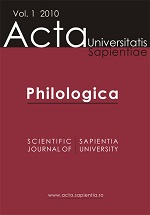Reterritorializing via Cultural Memory: Identity Politics in Elijah Muhammad’s 1959 Speech
Reterritorializing via Cultural Memory: Identity Politics in Elijah Muhammad’s 1959 Speech
Author(s): Péter Gaál-Szabó Subject(s): Language and Literature Studies
Published by: Scientia Kiadó
Keywords: Black Muslims; sacred space; deterritorialization; reterritorialization
Summary/Abstract: Elijah Muhammad, prominent leader of the Nation of Islam in the 1950s and 1960s, offers a controversial response to the challenges of American white social space of the first half in the 20th century: by extreme negation, he positions himself in opposition to it, however, at the same time, rendering it a battleground not only for contestation, but also for reclamation of space. The Black Muslim counterspace established in this way is based, in the first place, on an alternative sacred space, which proves not only a mere outcome of Black Muslim carving out sacred ground, but much rather of reterritorializing the sacred in a meaningful way to nourish the Black Muslim cultural self. The paper examines thus the construction of Black Muslim sacred space in Muhammad’s 1959 speech, using Deleuze and Guattari’s concept of reterritorialization as a basis for arguing for the contested nature of sacred space – a feature characteristic of Black Muslim identity politics.
Journal: Acta Universitatis Sapientiae, Philologica
- Issue Year: 4/2012
- Issue No: 2
- Page Range: 310-321
- Page Count: 12
- Language: English

